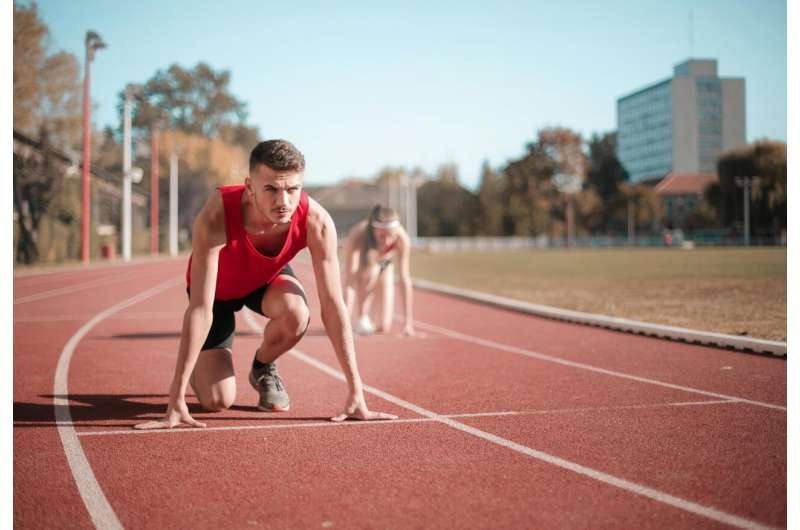This article has been reviewed according to Science X's editorial process and policies. Editors have highlighted the following attributes while ensuring the content's credibility:
fact-checked
trusted source
written by researcher(s)
proofread
Why does the Olympics have an 'AI agenda' and what does it mean for the future of sport?

The 2024 Summer Olympics, kicking off in Paris on July 26, will be novel for more than just the first inclusion of breakdancing. The event will also be the first installment of the quadrennial sportsfest since the International Olympic Committee (IOC) unveiled its Olympic AI Agenda.
You might be wondering why the Olympics—founded in 1896 in imitation of the famous athletic contest of ancient Greece—needs an "AI agenda." What can computers do to help the human body's quest to reach higher, faster and stronger?
The answer, according to the IOC, is quite a lot. The committee's far-reaching agenda envisions a world in which AI systems aid athletes in reaching their peak performance, help to ensure fair play, optimize event operations, and transform the spectator experience.
The goal, according to IOC president Thomas Bach, is "to set the course for the AI future of sport with responsible leadership by embracing the change while preserving the Olympic values."
Spotting talent, training athletes, rehabilitating injuries
Most of what the IOC has in mind is quite specific to sport, but some of it is the kind of AI applications that could be used by organizations in many fields.
Chief among sport-focused uses of AI are those that focus on individual athletes. By evaluating huge data sets based on performance, physical traits, and skills, AI systems can make it easier to spot talent. These systems could operate on a large scale and might identify people who are currently being missed.
AI could also play a role in helping talented individuals become world-class athletes. We are already seeing AI systems designed to support coaches by providing personalized training plans.
Optimizing training and uncovering hidden patterns in the behavior of individuals or groups of athletes is another promising application of AI models. Coaches can use these models to adapt training strategies continuously through feedback.
AI training systems can be more affordable and accessible than traditional coaching. There are also AI tools that can analyze video of movements such as a tennis swing in real time and provide feedback—and some need no more equipment than a smartphone.
Organizations such as Swimming Australia are already using AI tools to interpret athlete data using natural language.
AI-powered tools are also changing injury prevention and rehabilitation. By analyzing biomechanical data, training logs and medical records, AI can identify injury risk factors and provide personalized recommendations to avoid them.
For instance, AI models can analyze an athlete's movement patterns to detect imbalances, suggesting targeted exercises and corrective techniques to reduce injury risk and enhance recovery. Research also shows AI technologies can identify knee injuries with accuracy comparable to physicians, potentially reducing the need for specialized medical practitioners.
Refereeing and judging
The IOC also believes another key use for AI is to help make sport more fair.
Technological aids for officials are not new. Think of cricket's decision review system, the NRL's bunker, and electronic line calling in tennis. The FIFA World Cup's "semi-automated" offside technology uses AI.
AI judging is also coming to gymnastics. For casual viewers, it can be hard to understand why one gymnast gets a higher score than another.
In a bid to make judging more transparent, a judging support system was employed across all apparatus at the 2023 world championships. This AI-based tool strictly matches gymnast movements to the rulebook, and may make the sport more accessible for viewers.
Viewing experience
New technologies and digital innovations also make the Olympic Games more accessible for fans.
During the 2020 Tokyo games (actually held in 2021 due to the COVID pandemic), digital engagement doubled compared to the Rio games of 2016, with Australia being one of the top countries for consuming digital content.
A recent survey showed Australian audiences generally oppose AI-produced political news, but they are more accepting of AI-generated sports content.
More recent research from IBM showed 55% of global tennis fans surveyed believe AI will positively impact sports. This sentiment reflects a growing acceptance of AI's role in enhancing the experience for fans.
The IOC wants to use AI to create "more personalized fan experiences," but we don't yet know exactly what those will be.
Improving efficiency
Away from the sport itself, AI will also be used in an effort to improve efficiency, reduce costs and enhance sustainability in the Olympics. This will be for things such as optimizing transportation, workforce training, logistics and ticket sales.
The IOC plans to share the knowledge gained from this year's games with other sports organizers to help them create more engaging and cost-effective events.
AI technology will be used to safeguard athletes and officials from social media abuse. An expected half a billion social comments will be monitored during the 2024 Paris Olympics, with abusive posts automatically erased to protect athletes.
Change or be changed
In sport as in the rest of society, it will be crucial to establish guidelines for safe and responsible implementation of AI. An important first step is to ensure data fed to AI systems is secure, accurate, fair and inclusive.
In 2014, the IOC launched a program of reform in a fast-moving world with the motto "change or be changed." This imperative has taken on a new urgency with the rapid progress of AI technologies in recent years.
As we have seen, AI is making inroads at this year's games, and we can expect to see even more of it at the Los Angeles games due in 2028 and the 2032 games booked for Brisbane. Are we ready to embrace it?
This article is republished from The Conversation under a Creative Commons license. Read the original article.![]()


















